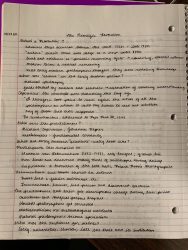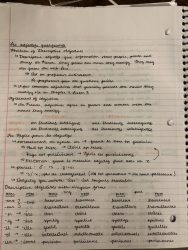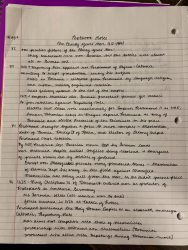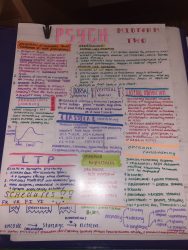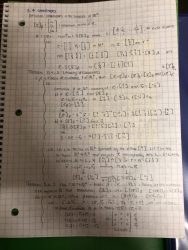Have you ever peered over the shoulder of a classmate to admire their notes? Stared longingly at their stationery? Wondered how the hell they color-code? Bwog’s very own writers share their note-taking schemes and systems for the pleasure of their readers.
It’s mid-November, and, though blasphemous coming from the mouth of an Ivy League student, I have become bored with notetaking. Lectures drag on, the semester drags on, and my notebooks become notably less neat. I sigh at the aesthetic, detailed scrawls of the still-motivated students next to me and decide that I need nothing more than inspiration. What better than a Bwog post delving into the admirable notetaking habits of my peers! I’m not the only curious one out there; let’s all just cross our fingers and hope their insight provides enough new enthusiasm to last us until winter break.
Bwogger James Perry writes all of their notes in a pristine cursive script!
What supplies do you use to take notes?
James: I only use college rules notebooks, doesn’t matter the brand, and exclusively Pilot G-2 pens!
Explain your “system!”
James: I tend to take notes different ways for different classes. For French I don’t try to take nice notes in class, I just kind of scribble during class and then retake my notes once we’ve finished the chapter, incorporating what’s in the textbook to what we covered in class. For my other classes, I write down everything important from the slides and try to elaborate on the notes as my professors lecture. They’re less exciting notes but they really help–and on my notes from textbooks, I write down the page numbers in the margins as I go in case I need to go back and reference for an essay or something like that. Makes it so much easier to keep track of quotes!
What’s your favorite class to take notes for and why?
James: I like taking notes the best for classes where it’s not just from slides; that’s why I enjoy French and European History—because they’re based on engaging in what we learn.
And any words of wisdom, note-taking-related or not?
James: My biggest piece of advice is to re-write notes to study. It works so well for me – for midterms I rewrote so. many. pages. of information and even though it took a while it was worth it! The big thing is making sure that the information you’re reabsorbing is actually significant because if you rewrite absolutely everything it’s not a huge help.
Bwogger Reyna Choi likes going extra on her notes!
What supplies do you use to take notes?
Reyna: I use a set of PaperMate Flair felt tip pens that someone gave in third grade, a 0.5 mechanical pencil from Korea, and ANENART dual brush pens :)
Explain your “system!”
Reyna: My system depends on the class – usually if it’s math I’ll scribble notes in class and then keep it really simple for study notes. If it’s anything else, I type my notes and then focus on making a sheet of what I don’t really know that well. I try to make that sheet pretty!
Are there pros and cons of the way you take notes?
Reyna: Pros: going extra on my notes makes me remember everything a lot better and it doesn’t feel like studying. Cons: going extra takes too long so I haven’t been doing it lately–it doesn’t work too well when you have multiple classes to study for.
What’s your favorite class to take notes for and why?
Reyna: I like taking notes for psych, since it’s a mix of diagrams and information. It feels a lot more fun.
And any words of wisdom, note-taking-related or not?
Reyna: Quizlet is your best friend!!
Bwogger Eva Sher draws molecules!
What supplies do you use to take notes?
Eva: My professor provides printed-out worksheets with notes and skeletons for mechanisms that I fill out while I follow her lectures. At home, I often rewrite the mechanisms we had done in class with different parts of the reaction in corresponding colors. I use a Muji hexagonal multi-color pen and a BIC mechanical pencil to take my notes.
Explain your “system!”
Eva: My system is to draw the molecules in pencil and to show electron-pushing or particular atoms of interest with different colors. The colors often either relate to things I want to emphasize or represent their originating from different starting materials.
Are there pros and cons of the way you take notes?
Eva: I think the way I take notes and study benefits me because it gives me a lot of practice, allowing me to better memorize the mechanisms. On the other hand, it does take up a lot of time.
And any words of wisdom, note-taking-related or not?
Eva: Some words of wisdom that I would give about note-taking is that using multiple colors in your notes is useful if you use a particular color-coding system. But if you use colors arbitrarily, they may distract from the actual material.
A fun guy taking notes via ABSFreePic


 0 Comments
0 Comments